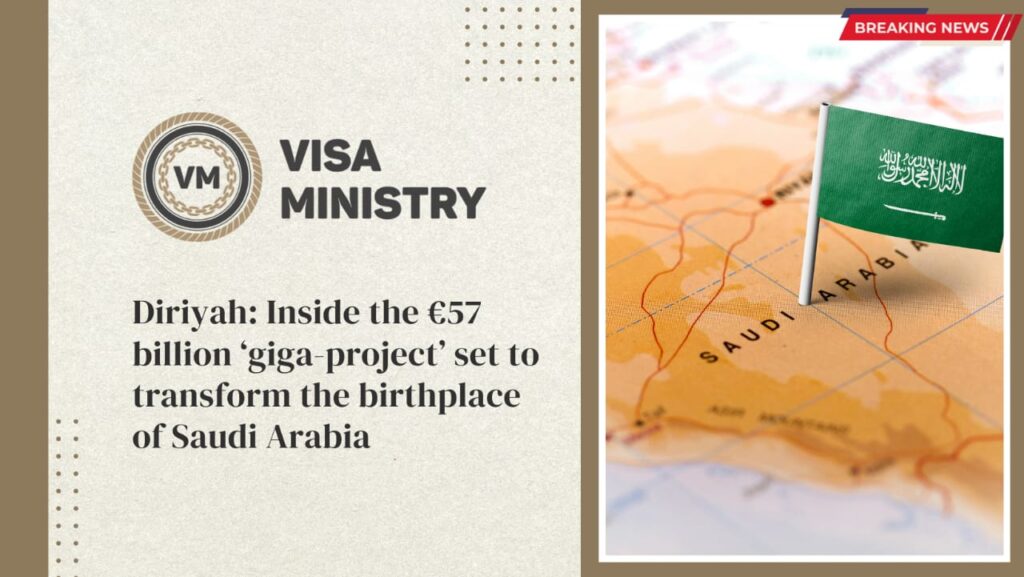Diriyah is being transformed into a metropolis within the Saudi capital as part of a €57 billion “giga project.”
There has never been a better moment to travel to Saudi Arabia’s Diriyah. Diriyah, which is only 15 minutes from the centre of Riyadh, is well known for the At-Turaif UNESCO World Heritage Site, which is regarded as the birthplace of the country.
It is now being built into a metropolis within the capital. The charming mud-brick city is redefining itself with the inauguration of eating destination Bujairi Terrace in December 2022 and a spate of new hotels.
The €57 billion “giga-project” is a component of Saudi Arabia’s master tourism strategy, which seeks to bring in more than 100 million tourists annually by 2030.
27 million travellers are anticipated to visit Diriyah.
Diriyah has great goals in mind. The city itself intends to bring in 27 million tourists and provide 55,000 new permanent jobs, which will boost GDP by almost €6.5 billion.
“That sounds monumental,” says Kiran Haslam, chief marketing officer of Diriyah Company, the organisation responsible for the project. “However, if you analyse what we’re doing, it’s a city. It fulfils all of your expectations for a city.
The strategy is working so far. At the Arabian Travel Market in 2023 in Dubai, Haslam announces that “38 hotels have already signed up with us.” They then have museums, art galleries, scientific centres, restaurants, and shops in their sights. “Therefore, it’s everything you would anticipate if you were to create a city on a blank canvas.”
There have already been several well-known visitors to Diriyah. Lionel Messi, a forward for Paris Saint-Germain and a professional footballer from Argentina, recently travelled there with his family. They visited a neighbouring rewilding project that is home to Arabian gazelles and leopards in addition to viewing the 300-year-old UNESCO World Heritage Site.
Saudi Arabia was founded at the city of Diriyah.
The first Saudi state was established at Diriyah in 1727, a city rich in history. The House of Al Saud, Saudi Arabia’s governing royal family, also calls it home.
Diriyah is a really special place, according to Haslam. It is a history lesson and the genesis of the Saudi Arabian Kingdom as we know it now.
The highlight is the At-Turaif UNESCO World Heritage Site, the first Saudi state’s historic royal house and seat of government.
The rest of the development was inspired by the area’s historic traditional Najdi architecture, which consists of sand-colored buildings made of unfired mud brick.
The ability to sustain change is essential for Diriyah.
Diriyah has established itself as an industry pioneer in sustainability as part of Saudi Arabia’s Vision 2030 agenda and the broader Middle East Green Initiative.
The idea is not brand-new in the city.”It’s a mudbrick city built ecologically and it’s still standing today,” claims Haslam. But it doesn’t mean they aren’t considering the future.
“We take a comprehensive approach to sustainability. That entire lifespan,” Haslam goes on. What would it imply in 20 years when the prevalence of obesity is lower and the average lifespan is longer? When there are more contented individuals who are prepared to work and raise families [here]?”
In order to realise this objective, Diriyah is maximising its innate beauty. Haslam mentions Wadi Hanifa, a seasonal river, when he says, “There’s a beautiful wadi that runs through Diriyah.” He continues, “beautiful palm groves, natural indigenous vegetation,” are found in this 2.6 square kilometre green space.
This area is being renovated and made available to the public for leisure as part of the city’s master plan. “I believe that excites us since the sustainability path is ingrained in who we are… This is cultural and community sustainability, according to Haslam.
By considering its past, Diriyah is building its future.
Historically a centre for trade and pilgrimage, Diriyah has long served as a meeting place for intellectuals, artists, and scholars to share ideas.
We frequently reflect on our history since it is so important to the present and future, claims Haslam. And we’re making every effort to ensure that we never forget the invaluable lessons we learned from 300 years ago.
The city is excited to immerse tourists in the origins of Saudi civilization through its ambitious historical development.
According to Haslam, “Many of the lessons we learn from Diriyah in the past are more applicable to the Diriyah we see in 2030 than any other time in the past.”
Source: euronews
